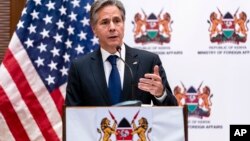U.S. Secretary of State Antony Blinken opened his three-nation tour of the African continent with a warning that several factors have led to a “recession” of democracy around the world.
Speaking before a group of human rights activists Wednesday in Nairobi, Kenya, Blinken said “even vibrant democracies like Kenya” have become increasingly vulnerable to misinformation, corruption, political violence and voter intimidation.
“The United States is hardly immune from this challenge,” Blinken said in an apparent reference to the January 6 attack on the U.S. Capital by supporters of then-President Donald Trump in an attempt to force lawmakers to disqualify Joe Biden’s victory in last November’s presidential election. “We’ve seen how fragile our own democracy can be.”
The top U.S. diplomat told the participants he wanted to hear their perspectives on democratic challenges and their ideas on solving them, as well as “how the United States can be helpful” to these efforts.
Blinken’s remarks were made before scheduled talks with President Uhuru Kenyatta and Foreign Affairs Ambassador Raychelle Omamo. The U.S. State Department said the trio would discuss the partnerships between their governments with respect to “ending the COVID pandemic and investing in health, addressing the climate crisis, building a more inclusive global economy, and strengthening democracy and respect for human rights.”
Blinken will also address specific regional issues such as ending the violence in Ethiopia, combating terrorism in Somalia and reviving Sudan’s transition to a civilian government, the State Department said Tuesday.
Kenya, a member of the United Nations Security Council, is an important player in issues related to regional countries including Ethiopia, Sudan and Somalia.
Blinken’s upcoming visit to Kenya is part of a three-nation tour to Africa that also includes trips to Nigeria and Senegal. His trip is partially aimed at raising America’s profile as a key player in the region as it competes with China.
Despite its large contributions of money and vaccines to contain the coronavirus and other infectious diseases, the United States has had little success in gaining influence in the region.
Some information for this report came from the Associated Press and Agence France-Presse.





